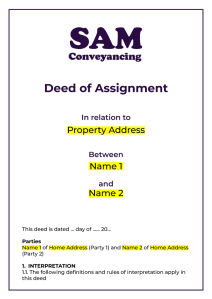Stamp Duty on Transfer of Property Between Spouses
Thousands of couples transfer property between themselves each year, often for tax efficiency purposes. But, did you know that these transfers can also have significant stamp duty implications? The answer is yes, it could, and you need to pay any tax due within 14 days of the transfer.
Here's a quick overview of what you need to know about stamp duty when transferring property between spouses:
- Stamp duty applies to property transfers between spouses if there's a "consideration" for the transfer, including money paid for the equity and a share of the existing mortgage debt.
- There is no Stamp Duty to declare or pay if there is no consideration, or if the transfer is part of a divorce, dissolution, separation, or annulment.
- You can assign your property for tax purposes to your spouse, without adding them to the Land Registry title, or mortgage. This avoids any consideration for the transfer.
There are 3 different rates that could be applied to a transfer and these are:
- Normal Rate. Married couples have to pay the normal rate of stamp duty on a transfer of equity if the consideration is high enough.
- Additional Rate. Married couples do not pay the Additional Rate of Stamp Duty on a transfer of equity if they are living together at the time of the transfer..
- Non-UK Rate. If either of the couple are Non-UK Resident, the Non-UK rate applies .
Transferring a half share of property to your spouse
One of the most common property transfers between spouses occurs when one partner owned the home before the marriage and wishes to share ownership equally. This typically involves transferring a half share of the property to the other spouse, making both partners joint owners of the marital home.
However, transferring a half share doesn't automatically mean you'll avoid stamp duty. Stamp duty land tax (SDLT) may be payable, depending on:
- The property's current market value.
- Whether the spouse receiving the share is a non-UK resident.
- Whether the transfer results in the receiving spouse owning more than one property.
The simplest way to transfer a half share is through a Transfer of Equity. This process generally involves completing a TR1 form, undergoing ID checks, and addressing any mortgage or leasehold considerations.
It's highly recommended to consult with a conveyancing solicitor to handle the legal side of the transfer and register it at the Land Registry. They will also help you understand your stamp duty obligations and submit the form on your behalf.
-
Fixed Fee Conveyancing from £399 INC VAT.
-
Fast Completions and Efficient Transfers.
-
Panel of CQS Solicitors on 99% of Lender Panels*.
-
ID1 Forms - Easy Online ID Verification.
How to transfer shares in property for tax efficiency
For couples who jointly own a rental property, transferring a portion of their beneficial interest to the spouse in a lower income tax bracket can be a tax-efficient strategy. However, it's important to remember that if the beneficial interest is split unevenly (e.g., 99% and 1%), the person with the larger share will bear a proportionally larger tax burden.
Beneficial interest refers to the economic ownership of a property, as opposed to legal title, which is the formal ownership. Think of beneficial interest as the right to enjoy the financial benefits of the property, such as rental income, while legal title is the right to own it on paper.
By transferring beneficial interest, couples can effectively allocate rental income to the spouse in the lower tax bracket, potentially reducing their overall tax liability.
This can be achieved through a deed of assignment, a transfer of equity, or a sale and purchase.
Is CGT payable on transfer of property to spouse?
While there's no Capital Gains Tax (CGT) to pay on property transfers between married couples, you must still complete Form 17 for HMRC.
This can be done through a severance of the joint tenancy if required, and a Deed of Trust or Deed of Assignment. This ensures that HMRC is aware of the change in beneficial ownership and can accurately assess your tax liability.
Even if you legally owned the property before the marriage, transferring beneficial interest can be seen as a gift or contribution to the marriage, potentially giving your spouse a greater claim to the property during a divorce.
The individual CGT allowance is divided in the same way as the beneficial interest. For example, if a property was originally purchased 50-50, and then transferred to 99% and 1%, the CGT on the sale would be calculated based on the 99/1 split, not the original 50/50 split.
Share rental income or transfer beneficial interest quickly and easily with a Deed of Assignment. Get your first draft within 1-2 working days*.
Our experienced solicitors draft deeds for various purposes, from buy-to-let transfers to protecting your interest in the family home.
- Transfer rental income efficiently.
- Assign Capital Gains securely.
- Transfer full or partial ownership seamlessly.
What Stamp Duty is payable on second properties for married couples?
If you're buying a second home, you will incur the second home stamp duty. However, transfers of property between spouses or civil partners who are living together are exempt from the higher rate of Stamp Duty Land Tax (SDLT). This is a significant benefit, as the higher rate can add a substantial cost to a property purchase.
However, there's a crucial caveat: If you jointly own the property you are purchasing with someone other than your spouse or civil partner, the higher rate of SDLT will apply. For example, if you and your spouse co-own property with a business partner, and you purchase another property jointly, the higher rate applies.
Stamp Duty exemptions for transfers between spouses
You do not pay Stamp Duty Land Tax (SDLT) if the transfer is made as part of a formal agreement or court order related to these circumstances.
Specifically, this exemption applies if you are:
- Divorcing.
- Dissolving a civil partnership.
- Annulling your marriage.
- Legally separating.
In these cases, there’s no need to tell HMRC about the transfer, even if the value is more than the usual Stamp Duty Land Tax threshold.
What stamp duty is payable when transferring a jointly owned property?
Stamp Duty is paid based on the total consideration for the transfer. Consideration is defined in the Finance Act 2003, Schedule 4, as cash payments and the assumption or release of debt, such as a mortgage. When you transfer property to your spouse this will be any money they pay for the equity and a share of the existing mortgage/s on the property.
It is unlikely a married couple is going to pay any money for a share in a property, as the transfer is normally to add your spouse to the marital home, or onto a buy-to-let to reduce income tax. This means the only consideration will be the existing mortgage.
If you're adding your spouse to your property, and there is a mortgage, there is a consideration and you must file a SDLT return, however, the tax you pay, if any, depends on the consideration. Here's an example:
Example: Mohammed is married to Fatima and he owns a buy-to-let property in his sole name worth £300,000. There is an existing mortgage of £200,000. Mohammed transfers Fatima onto the legal title and the mortgage, and she owns 99% of the beneficial interest because she has no income. The consideration for this transfer is 99% of the existing mortgage which is £297,000. A Stamp Duty Land Tax return needs to be filed to HMRC and pay the normal rate of tax of £4,850 within 14 days of the transfer.
Why 99% and not 50% of the existing mortgage?
Under SDLTM04040, HMRC state, when "determining the amount of debt assumed each person’s liability for the debt is taken to be a proportion of the debt corresponding to the share that they own in the property subject to the debt".
This means for stamp duty purposes, even though you have joint and several liabilities for any existing debt, the consideration is the percentage of the beneficial interest you hold. In the example above, Fatima holds 99% of the beneficial interest so the consideration is 99% of the existing debt.
| Property Price | Standard Rate of Stamp Duty | Additional Home Rate (updated post Oct 2024 budget) | Non UK Resident Rate |
| £0 - £125,000 | 0% | 5% | 2% |
| £125,001 - £250,000 | 2% | 5% | 2% |
| £250,001 - £925,000 | 5% | 10% | 2% |
| £925,001 - £1.5 million | 10% | 15% | 2% |
| Over £1.5 million | 12% | 17% | 2% |
Our solicitors can draft your Deed of Assignment within 1 to 2 working days.
- Assign any amount of beneficial interest from 1% to 100% between the legal and non-legal owners.
- Change the beneficial interest at a future date for Capital Gains Tax purposes.
- For tenants in common.
- Does not assign debts or outgoings.

£275 INC VAT
Andrew started his career in 2000 working within conveyancing solicitor firms and grew hands-on knowledge of a wide variety of conveyancing challenges and solutions. After helping in excess of 50,000 clients in his career, he uses all this experience within his article writing for SAM, mainstream media and his self published book How to Buy a House Without Killing Anyone.
Caragh is an excellent writer and copy editor of books, news articles and editorials. She has written extensively for SAM for a variety of conveyancing, survey, property law and mortgage-related articles.










